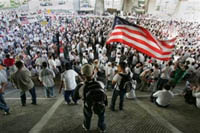Bush’s ‘No’ to Nuestro Himno shows what USA without immigrants like
The Great American Boycott 2006. On the first of May millions of Latin-immigrants did not go to work, did not do the shopping, but instead took to the streets of America’s major cities in mass protest. Their aim was clear: to prove to America just how important the contribution of Spanish-speaking minorities is to the American economy. Los Angeles witnessed the greatest protests as 400 thousand people gathered to voice their anger at the tightening of immigration laws.

Ethnic flash mobs have become one of the most effective ways of standing up for one’s right and became popular with ethnic minorities as early as the 1960’s when African Americans demanded their rights from a prejudiced and intransigent America. It now seems that the idea thrown up in the film “A Day Without Mexicans”, in which director Sergio Arau shows America just how important immigrants are for America , has finally rang true. But what in fact led to such mass defiance in the first place?
The President of the USA George Bush has always made a public display of how he spent his childhood years in Midland, Texas, surrounded by Spanish-speaking children.
Campaigning for the post of Governor in Texas and later for President, Bush proudly flaunted his Spanish linguistic skills as a way winning the vote of millions of Latin Americans.
Bush also has a penchant for folk music. He loves country, folk and even “Tex-Mex” a mix of Texas and Mexican style rock. But it seems even Bush’s proud multicultural stance has its limits. While delivering a speech in the Rose Garden of the White House on the 28th of April Bush categorically declared that he is against ‘Nuestro Himno’ (Our Hymn – Spanish). At first glance this declaration seems somewhat strange for ‘Nuestro Himno’ is the American National Anthem, ‘The Star Spangled Banner’ in Spanish. The premier of ‘Nuestro Himno’ took place last Friday and was played by all Spanish speaking radio stations in America . Yet Bush is decidedly against the given situation. When asked by reporters in the Rose Garden if the Spanish version of the anthem is authentic he curtly replied: “No, I don’t consider it to be.” Yet what was in discussion was not the quality of the translation. The President asserted that he objects to the very principal of the Spanish version: “People who want to become citizens of our country should learn English. And moreover they should learn to sing the National Anthem in English.” On the same day the Senator of Tennessee Lomar Alexander announced that a resolution is being carried through the Congress, “that reminds the country why the National Anthem must always be sung in English.”
Till the very last moment Bush has tried to sit on the fence concerning the controversial question of immigrants and the increasing number of Latin Americans and Mexicans in America. Bush supported the legislation that provided immigrants with temporary legal status with the‘hope’ ofbeing grantedcitizenship, but demanded that each applicant knew English and, above all, promised decisive measures to prevent a new wave of immigrants. The unequivocal ‘No, that Bush gave to the Spanish version of the anthem has been singled out by his opponents as evidence that the President supports national unity, but rejects multiculturalism. And they are right in thinking so. Bush, having said ‘No’ to the Spanish version of the anthem ‘Nuestro Himno’ led his country and the Congress to understand that he has no intention of supporting the position of Latin Americans in immigration legislation.
Yet despite the President’s affirmative ‘No’, on Monday the first of May ‘Nuestro Himno’ was played throughout America, from the Atlantic to the Pacific. It was shortly followed by the economic boycott, which left a threatening silence throughout the country as Latin American schools and shops stood eerily empty. The largest boycott took place in Los Angeles where one third of the population is of Latin descent. Protestors took to the streets in huge numbers to protest against the anti-immigration legislation. If we take into account that 12 million illegal immigrants do the most menial, undesired yet necessary work in the county, then it’s possible to imagine the enormous impact of the boycott in the USA. The present confrontation in the country shares much in common with the protests of African Americans in the 1960’s, in which they were forced to protest for the right of citizenship.
On the eve of the boycott rumors were spread that federal power were organizing raids against illegal immigrants. Terrified Latin Americans fled from the workplace, took their children away from school and hid themselves in their homes. Behind the mass panic that swept the nation was the order given by the Homeland Security Secretary Michael Chertoff for the arrest of more than a thousand immigrants in over 26 states of the country. The small town of Freehold with a population of 13,000 literally became deserted overnight. Sheryl Little, the director of the Centre of Defense of immigrants in Florida, recounted how the city was overcome with panic: ‘Even pregnant women are afraid to visit the hospital, fearing they’ll be ambushed!’
Leaders of several Latin-American organizations declared they suspected the rumors of counteraction and round-ups by the police were spread by powers attempting to deliberately prevent the protests from going ahead. Yet at the same time these rumors gave rise to the start of the economic boycott, and thereby those who shut themselves away, fearing arrest or deportation involuntarily helped those who were actively protesting. After all, the boycott’s main aim was to fight the law which classes illegal immigration as a criminal offence and all it’s ensuing consequences. Here then is ‘Nuestro Himno’!
AP photo
Moskovsky Komsomolets
Discuss this article on Pravda.Ru English Forum
Subscribe to Pravda.Ru Telegram channel, Facebook, RSS!





